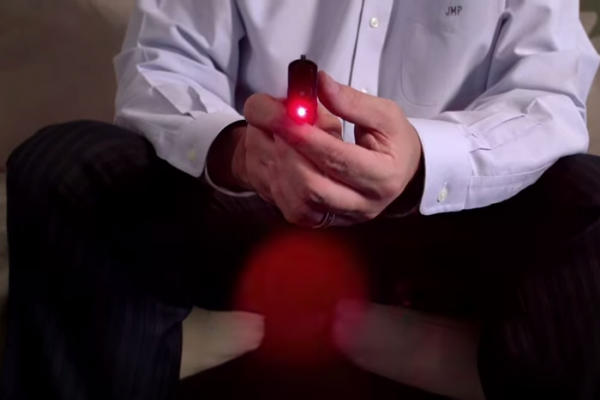Though Rev. Rob Schenck was attending the Washington, D.C., premiere of The Armor of Light — a 2015 documentary in which he himself was the principal character — he looked exhausted.
“One of the reasons I may appear exhausted tonight is because, well, I’m exhausted,” Schenck admitted to the audience last weekend at the AFI DOCS film festival.
“And one of the reasons I'm exhausted is because I spent the last 24 hours with the people in Charleston and at beautiful, magnificent Mother Emanuel church.”
As our nation continues to lament the nine black Americans who were killed by a white gunman last week in a historic Charleston church — and perhaps begins some long-overdue conversations about white supremacy and gun control — it’s hard to imagine a more prescient film than The Armor of Light.
Directed by filmmaker Abigail Disney (yes, the grandniece of Walt Disney), The Armor of Light follows Schenck, a conservative white evangelical pastor in D.C., as he comes to the conclusion that one cannot be faithfully “pro-life” and also “pro-guns.”
A lifelong anti-abortion activist, Schenck has impeccable evangelical credentials: he is the original founder of D.C.’s multi-site National Community Church; founder and president of Faith and Action, a Christian lobbying group known for its 850-pound granite copy of the Ten Commandments facing the entry to the Supreme Court; founder and co-president of the National Clergy Council; and Board Chairman of the Evangelical Church Alliance. By his own description, Schenck describes his constituency as “conservative — very conservative.”
Consequently, after the 2013 D.C. Navy Yard shooting left 13 people dead in his own neighborhood, Schenck risked losing those credentials — and possibly his career — as he publicly began to question the unholy alliance between God and guns that exists among many conservative evangelicals.
Though Schenck has already made a few public statements about his support for stricter gun control as part of his pro-life stance, he expects that The Armor of Light, released earlier this year, will cause him to lose "significant" financial support.
Not that he minds.
"There are some things worth the cost,” said Schenck to audience applause after the film. “And I’ve come to the conclusion that this is one.”
A key step in Schenck’s pro-gun de-conversion in the film is when he meets Lucy McBath, mother of Jordan Davis, an unarmed, black 17-year-old who was killed in 2012 at a Florida gas station by a white man, Michael Dunn, claiming the protection of Florida’s controversial Stand Your Ground law. In 2014, Dunn was convicted of first-degree murder.
“I lost Jordan to the explicit racial bias of a man empowered by a gun as he shot ten rounds into a car of unarmed black teenage boys,” said McBath last week in D.C., at The Summit, a conference hosted by Sojourners.
“But more importantly, I lost my son to the broader national crisis in America where expansive gun laws and overt biases towards communities of color drive the rampant gun violence that we see existing today.”
Following Jordan’s death, McBath became a national spokesperson for Moms Demand Action for Gun Sense in America. In the film, McBath visits Schenck in his D.C., office to ask for his public support as a fellow Christian on increased gun control.
“It will be hard for you,” admits McBath when she talks with Schenck, “but isn’t it far better to stand before God and do what you know in your heart is right?”
By the end of the film, Schenck agrees.
“The gun is almost an invitation to give into fear,” he explains. “And fear should not be a controlling element in the life of a Christian.”
Though the majority of the film follows Schenck as he tries to convince his mostly white, very conservative supporters to rethink the connection between faith and firearms, The Armor of Light also draws attention to the fact that evangelicals’ feelings about guns are split along racial lines. According to a 2013 survey, 76 percent of minority Protestants, including black Protestants, support stricter gun control laws. Among white evangelicals, however, that support drops to 38 percent.
“You can’t ignore the racial dimensions to this trauma,” says Schenck in the film.
“These questions divide white and black Bible-believing, spiritual Christians. That division should not exist, but it does.”
So while some continue to argue that Christians should carry guns in church to avoid tragedies like the Charleston shooting — one NRA board member even dared to blame Rev. Pinckney for his congregants’ deaths because he voted against concealed carry laws — Disney and Schenck emphasized that no one at Mother Emanuel church expressed any such feelings. Instead, in a panel discussion following the film screening moderated by Washington Post religion reporter Sarah Pulliam Bailey, Schenck described “the large number of people there who wanted to pray for the perpetrator, who wanted to pray for that young man and his family. And they did so sincerely and some with tears.”
Schenck described the atmosphere at Mother Emanuel as “an absolute love-fest.”
“People who were loving on each other, loving God, loving the memories of these beautiful people who had died,” said Schenck.
“No one was thinking, ‘If only somebody had been packing a Glock or a Sig Sauer this whole thing would have been better.’ No one expressed that,” he explained.
“The only expression was: ‘May God get the glory and may love win over hatred.’ That was what the whole morning was about. It was beautiful.”
Got something to say about what you're reading? We value your feedback!

